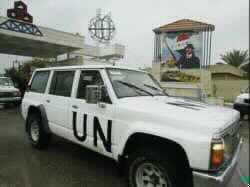U.N. arms inspectors examined two Iraqi military industrial plants and a "sensitive" army base Saturday, enforcing a resolution that gives Baghdad one last chance to disarm or face war. In a third day of inspections, International Atomic Energy Agency (IAEA) experts spent three hours at the military complex run by the Public Company of the Mother of All Battles, at Yusoufiyyah, some 10 miles south of Baghdad.
The company, named after Iraq's term for the 1991 Gulf War is an arm of the state's Military Industrialisation Commission (MIC) in charge of developing weapons. Plant officials say it produces light machinery, including spare parts for vehicles.
The chief of the site, Hussein Hamoudi, told reporters the inspectors wanted to make sure the company was not producing banned weapons. He said they checked cameras and sealed equipment installed by previous inspection teams.
Hamoudi said he was informed by Iraqi liaison officials of the visit about an hour before the arrival of the inspectors at 9 a.m. (1 a.m. EST).
U.N. arms team spokesman in Baghdad Yashuhiro Ueki said the inspectors were vigilant in keeping plans of the visits unannounced. He added that he was not sure if the Iraqis had called all key sites to be visited or if the call to Hamoudi was a specific alert.
"Our inspectors simply go to a certain location, including for instance today one of the sensitive sites, unannounced," Ueki told reporters.
"But if the Iraqi side somehow informs them or alerts them either specifically or generally, that the U.N. inspectors left at 8:30 this morning... that's not something that we can control," Ueki said.
U.N. sources had said recently that the inspectors had asked for electronic equipment to scan their operations center at Baghdad's former Canal Hotel against possible bugging during their arms inspectors' four-year absence.
The first of several helicopters ordered by the inspectors will be flown into Baghdad Sunday, Ueki said.
Hamoudi said the inspectors took some samples from the complex, which was bombed during a December 1998 U.S. and British air campaign against Iraq. He denied the plant had ever produced weapons of mass destruction.
Ueki said the plant has a "dual use" capability.
Before returning to their headquarters, the IAEA experts later spent two hours at another nearby MIC complex named Milad, in Yusoufiyyah. That facility was previously known as al-Furat, originally planned by Iraq for nuclear research, and was intensively investigated by U.N. inspectors in the 1990s.
"We don't have anything to hide," said Brigadier Dr. Samir Ibrahim Abbas, one of the top officials at Milad.
Another group of inspectors from the U.N. Monitoring, Verification and Inspection Commission drove to an Iraqi army post near Balad, 48 miles north of the capital.
The inspectors spent five hours at the post which has missile and ammunition warehouses. An army unit specialized in decontamination after any attacks by nuclear, chemical and biological weapons is also deployed at the site, an Iraqi officer said.
The site, known as the Chemical Defense Battalion, which reports to a unit of the Ministry of Defense conducts training activities in the area of chemical, biological and radiological defense for military personnel.
It "was considered by Iraq as one of the sensitive sites," Ueki said, adding the site had been inspected in 1998. He said inspectors arrived unannounced and had immediate access.
The inspectors, who carry out unannounced visits, did not work Friday. Earlier, the sweep covered five sites.
RECONNAISANCE PLANES
In Berlin, the German defense ministry said it was considering a request from the inspectors for unmanned reconnaissance planes.
The "Luna X-2000" aircraft are equipped with digital color and heat-seeking cameras and would be used to fly over large and difficult to access chemical or industrial complexes.
A German defense ministry spokesman told NDR radio that one reconnaissance unit was composed of 10 to 12 of the drones.
Iraq has pledged full cooperation with the inspectors, who returned to Iraq this week after a four-year gap to search for chemical, biological and nuclear arms.
But an Iraqi official newspaper, al-Jumhouriya, Saturday denounced U.N. demands that Baghdad produce a full account of all its banned weapons programs by December 8 -- even though Iraq has promised to meet the deadline.
"It is quite clear that this paragraph explicitly accuses Iraq of possessing weapons of mass destruction," a front-page editorial said. "It also casts doubts about Iraq's sincere cooperation with U.N. Security Council resolutions."
The demand is part of Security Council Resolution 1441, passed on November 8, which sets terms for arms inspections in Iraq and threatens serious consequences for non-compliance.
Iraq had vowed to submit a declaration of all its weapons files: nuclear, chemical, biological and ballistic.
IAEA head Mohamed ElBaradei said Iraq should come clean in its December 8 "or it will subject itself to dangerous consequences under the resolution."
"I believe Iraq now has one last opportunity to return to being a country with full sovereignty like the rest of the world, by complying 100 percent with the Security Council resolution, and it has no chance (with noncompliance) not even one percent," he told al-Bayan daily in the Gulf.
With the December 8 deadline approaching, Washington announced that one of its top diplomats would visit eight European countries and Turkey next week to consult on Iraq.
PHOTO CAPTION
A UN vehicle of the International Atomic Energy Agency (IAEA) monitoring team passes in front of a big poster of Iraqi president Saddam Hussein (news - web sites), after they finished their inspections at the Milad factory in Youssefiah, some 15 kilometers (9 miles) southeast Baghdad, Iraq, on Saturday Nov. 30, 2002. (AP Photo/Hussein Malla)
- Nov 30 10:20 AM ET
- Author:
& News Agencies - Section:
WORLD HEADLINES


 Home
Home Discover Islam
Discover Islam Quran Recitations
Quran Recitations Lectures
Lectures
 Fatwa
Fatwa Articles
Articles Fiqh
Fiqh E-Books
E-Books Boys & Girls
Boys & Girls  Articles
Articles










